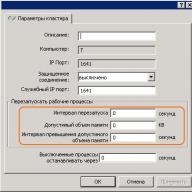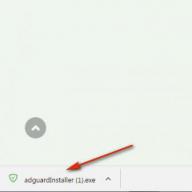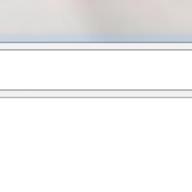In the last article, we met with such a concept as. Today I’ll tell you in detail what are browser cookieswhere cookies are stored and why it is recommended to periodically clear them.
What are cookies?
Cookie (or Cookies) - these are small service files with text information that store the settings of sites visited by the user. Cookies, as well as the cache, are stored in the computer’s browser (or rather, on the computer’s hard drive).
The most common function of cookies is to remember your registration data (logins and passwords) on various sites on the Internet. If you enter a username and password on any site and then allow the browser to remember them, then you will not have to enter this data again in the next visit to the site. At the time of accessing the web page of this site, the browser will send the existing cookie with your data to the site server, and authorization will happen automatically.
Cookies can store not only your logins on sites, but also other information about you. I think many have noticed this pattern: for example, you visited the site about multicookers, or looked for some information about them in a search engine. After that, everywhere on various sites you begin to see contextual or banner advertising of these same multicookers. It’s just the cookies that are to blame (though not only them): the information stored in cookies can affect what kind of advertising will be displayed to the user on the sites.
Almost all authorization sites require the user's browser to support cookies. Cookies play a special role in the operation of online stores. Having come to such an online store, you can put your favorite product in the basket; then search for the second, third product, following the links within the site. All this time, the site remembers what exactly lies in your basket and nothing disappears from it. This data also stores cookies.
Why clean browser cookies?
Important addition: deleting cookies in some browsers will also delete all your saved logins and passwords from sites. Therefore, be careful: if there is no separate column about passwords in the browser in the window for selecting deletion parameters, then your authorization data will also be deleted. For example, in Google chrome
there is a separate item “ Passwords”- that means in this case you can safely clear cookies: we will not lose passwords after this operation!  To clear cookies immediately in all browsers installed on the computer, you can use a good free program.
To clear cookies immediately in all browsers installed on the computer, you can use a good free program.
|
Terminology File " cookie"(English cookie - cookie. In Russian, usually" cookie ", plural -" cookies") is a text string that is included in http requests and responses. Cookies are used to store data about a user visiting various pages of the site or returning to the site after some time. Cookies store information about the user stored on his computer, such as some personal user data and individual parameters (login and password) used when visiting the site. |
Types of cookies. Permanent and temporary cookies
Cookies are of several types.
You can enable the storage on the local computer of all their types, some types, or prevent their storage at all.
If all cookies are not allowed, then browsing some websites in the previously configured mode becomes impossible.
Cookies may be stored in random access memory (temporary cookies) or register on hDD (permanent cookies).
The list of temporary Internet files is updated with links to existing cookies.
Persistent cookie called a file saved on the computer after exiting the browser. This cookie can be read by the site when it is visited again. Persistent cookies are written to the Cookies folder located in the user profile folder or in the Windows directory. A cookie saved on a computer can only be read by the site that created it.
For example, in Windows XP, you can view cookies at:
C: \\ Documents and Settings \\ ... \\ Local Settings \\ Temporary Internet Files
Temporary Cookies they are saved only during the current browser session and are deleted from the computer after exiting the browser.
Note
Internet explorer versions 3.x and 4.x do not distinguish between permanent and temporary cookies.
Internet Explorer version 4 and higher has the ability to enable or disable cookies, or receive Internet Explorer hints before using cookies. Disabling cookies may cause some web services to malfunction, and you will not become an anonymous user, sites will not stop monitoring your preferences.
Internet Explorer 6.x has additional features for filtering cookies.
By default internet Explorer 6.x blocks third-party cookies that do not have a compact policy (compressed, computer-readable privacy statements), or third-party cookies that have a compact policy that indicates that personal information is used without the consent of the owner.
Cookies that allow the use of personal information without the consent of the owner are deleted when Internet Explorer shuts down. Basic cookies that do not have a compact policy are linked (their use is prohibited without a basic context).
Cookie Assignment
One of the main purposes of cookies is to create user-friendliness and save time. Cookies tell the site you're viewing that the user has returned to a specific page.
For example, if you use a personal web page or enter registration data, cookies help the server recover the information associated with you (in case of authorized access to the site, cookies and login and password are saved during the session, which allows the user not to enter them again when prompted each password protected document). This can be useful for simplifying the input of information into forms, for the process of recording your personal data, etc.
When you visit the site again, the previously provided information can be restored, facilitating the reuse of previously selected features of the site.
The server can read the information contained in cookies and, based on its analysis, perform certain actions. Using cookies, they often build functions of placing orders in online stores, the work of counters for counting visitors, active advertising systems (click clubs).
One common area use of cookies - This is an individual profile setting for each registered user.
Basic and third-party cookies
The main cookies are cookies associated with the primary domain.
Third party Cookies are cookies related to any other domain. If on our website www..site, www.antula2.ru and www.antula3.ru and these sites created cookies, the cookies on the sites www..site would belong to the main cookies, and the cookies on the sites www.antula2 .ru and www.antula3.ru would be third-party cookies.
Cookies are uniquely associated with the user profile and can only be read by the domain that created these cookies.
Cookie format and syntax
C ookie is part of the http header.
Full description fields s et-c ookie http header:
s et-c ookie: name \u003d value; expires \u003d date; path \u003d path; domain \u003d domain _name; secure
Minimal field description s et-c ookie http header: s et-c ookie: name \u003d value;
name \u003d value - a string of characters, excluding line feeds, commas and spaces.
Colons, commas, and spaces are not allowed.
name - cookie name, value - value.
expires \u003d date - cookie storage time, i.e. instead of date should be a date in the format "expires \u003d m onday, dd -mon -yyyy hh: mm: ss gmt", after which the cookie expires.
If this attribute is not specified, then the cookie is stored for one session, until the browser closes.
domain \u003d domain name - The domain for which the cookie value is valid.
If this attribute is omitted, then by default the domain name of the server on which the cookie value was set is used.
path \u003d path - this attribute sets the list of documents for which the cookie value is valid. For example, specifying "path \u003d / win" will cause the cookie value to be valid for documents in the / win / directory, in the / wings / directory and files in the current directory with names like wind.html and windows.shtml. In order for cookies to be sent at each request to the server, you must specify the server root directory, for example, "path \u003d /".
If this attribute is not specified, then the cookie value applies only to documents in the same directory as the document in which the cookie was set.
secure - if this token is on, then cookie information is sent only through https, in protected mode.
If this marker is not specified, then the information is sent in the usual way.
Header http syntax for ookie field c
When a document is requested from the http server, the browser checks its cookies for compliance with the server domain and other information. If cookie values \u200b\u200bmatching all conditions are found, the browser sends them to the server as a name / value pair:
Cookie: name1 \u003d opaque_string1; name2 \u003d opaque_string2 ...
You can set multiple cookie values \u200b\u200bat the same time.
If cookie accepts a new value with an existing cookie with matching name, domain and path parameters, then the old value is replaced with the new one. In other cases, new cookie values \u200b\u200bare added to the old ones.
Using expires does not guarantee the preservation of cookies for a specified period of time, since the browser may delete the entry due to lack of allocated space or for any other reason.
The following restrictions apply to cookies:
Up to 300 cookie values \u200b\u200bcan be stored in total.
Each cookie cannot exceed 4KB
Up to 20 cookie values \u200b\u200bcan be stored from a single server or domain.
If the limit of 300 or 20 is exceeded, the first time record is deleted.
If the limit of the volume of 4 Kbytes is exceeded, a piece of the record is cut off (from the beginning of this record), which is equal to the excess of the volume.
Ways to Set Cookies
There are various ways to set cookie values, depending on how these values \u200b\u200bare used and the type of server.
You can set different cookie lifetimes and set subsets of URLs where the given values \u200b\u200bare valid.
The main ways to set cookies: using html meta tags, JavaScript and CGI scripts.
Simplest way set cookie - use the appropriate META tag in the container
... any static html document.In general, the format is as follows:
In any way, you can specify one or several values \u200b\u200bat once.
Problems Related using cookie
The development of e-commerce and Internet trading has led to an increase in the number of sites using cookies. One way or another, but using cookies, information about site visitors is collected. Most visitors will not be pleased that they are being tacitly monitored.
Despite the fact that it is believed that cookies cannot be used to run program code (run programs) or to infect a computer with viruses, no, no, let’s slip a message that the attacker used the cookie for one or another unwanted action.
Additional Information
Request for Comments (RFC) 2965, "http State Management Mechanism". RFC documents can be found on the RFC Editor website: http://www.rfc-editor.org/
Internet Explorer Help.
Nowadays it is difficult to imagine at least one person without a computer or laptop. Accordingly, computer literacy of the population is gradually reaching decent values. Of particular importance is the ability to work with Internet browsers, since 99% of all the time that a modern person spends at a computer, he sits on the Internet.
But not everyone knows what cookies are. But turning them on or off often requires the sites you visit! So what is it and what are they for?
Introduction
Surely you are registered on at least one site. If so, is it not interesting to you how the site determines the fact of your visit, so as not to force you to re-enter the registration data? This is what cookies are responsible for. Simply put, these are small files that store user data.
In particular, these files contain your username and password, your mailing address and other information, if you need them to enter a specific site. This is what cookies are. They make it easier and simpler to work with the site, allowing you to not enter credentials at each visit.
But they store not only identification information on the site, but also other information. In particular, if you are setting up appearance of the same mail service (use of visual themes), then cookies are also needed to correctly display all the settings you made.
Where are they stored?

Based on the foregoing, I would like to know where all these identifiers are stored. After all, if they fall into the wrong hands, the consequences for you can be very sad! Don’t worry: all modern browsers save them to your computer’s hard drive. Where can I find them?
They are stored at the following address: C: \\ Documents and Settings \\ ... \\ Local Settings \\ Temporary Internet Files. Instead of an ellipsis, the name of a specific computer is set.
It is easy to guess that “cookies” are a tidbit for many malicious programs, because if you take possession of files with ready-made credentials to enter the site, you can get full access to any user account!
What are they like?
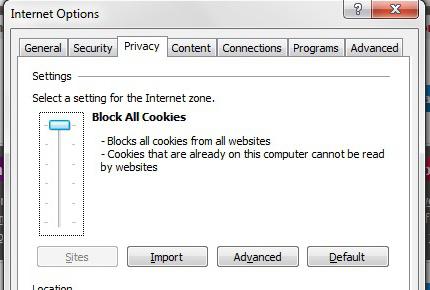
After learning about, stop there is not worth it. If you think that they do not differ in type and purpose, then you are mistaken. There are “cookies” temporary and permanent.
Do you remember the storage address we talked about above? It is just there that their constant variety is stored there. These cookies are used to long-term storage information about visited sites, unless otherwise specified by your browser settings.
Accordingly, temporary identifiers are not stored anywhere, being used only once per session. Temporary cookies are stored for a limited amount of time in RAM or in the swap file, which are then completely cleared of information.
How to block cookies?
To completely exclude their storage on your computer, you need to configure your Internet browser accordingly. Consider this process as an example. internet browser Explorer
Since the latest is the 11th version, we will talk about it exactly. Having opened the main window, look to the right: in the upper corner there should be a gear icon. It is called "Service." In the menu that opens, select "Internet Options." It is necessary to find the tab "Confidentiality" in it. It will open in which using the slider you can set the level of security you need.
The slider can be set to the "Low" level of protection. In this case, all http cookies will be accepted, regardless of the sending site. This installation is recommended to be used strictly for your trusted sites, from which your computer is guaranteed not to be attacked by malware.
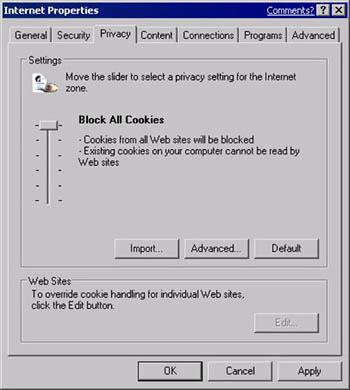 If you choose “Medium” level, then “cookies” will be accepted only from the site on which you are currently located. It is recommended to use it when you work with several trusted sites (online banking, for example), while continuing to surf the Internet without restrictions.
If you choose “Medium” level, then “cookies” will be accepted only from the site on which you are currently located. It is recommended to use it when you work with several trusted sites (online banking, for example), while continuing to surf the Internet without restrictions.
Finally, the "High" level of prohibition provides for the complete absence of "cookies" files. This provides excellent confidentiality and anonymity, but it should be remembered that with these settings, some sites simply will not be able to work adequately. In particular, the aforementioned online client of the bank will refuse to conduct any operations with your bank account or card.
Thus, before you enable cookies in your browser, you will need to set the slider to the lowest position. Honestly, in the presence of a more or less normal antivirus, this level in most cases is enough for safe surfing on the Internet. But sometimes it happens that all accumulated cookies are required to be completely deleted.
Why delete them?
![]()
For example, you do not want someone to enter your mail while you are away from the computer. If some attacker gains access to this kind of information, he will be able to take advantage of some resources on the Internet, leaving messages there on your behalf. Given how tightened legislation in the field of Internet technologies, this can have the most sad consequences.
If too many “cookies” accumulate on the computer, then the speed of the computer can slow down significantly, since they practically defy defragmentation.
This can be especially noticeable in the case of Ognelis, the launch speed of which in this case can drop very much. If we talk about javascript write cookies, then their permanent storage on the computer can even lead to the inability to read the latest version of the site.
Delete cookies from the computer
First, we will again look at the process of removing them using Internet Explorer as an example. To do this, you again need to find the “Service” button in the form of a gear icon, go to “Internet Options” and open the “General” tab. There is the item “Browsing History”, under which there is a button “Delete”.
Click on it with the left mouse button. A dialog box for the delete wizard opens, with which you can easily delete all cookies from your computer.
We clean "Opera" and "Chrome"
What about Opera? It also does not present any difficulty. Considering that for some time now Opera has become a clone of Google Chrome, the following instruction is quite suitable for cleaning all “chrome-like” browsers.
So, to completely erase them from the disk, you must perform the following operations. First, open the browser menu, go to the "Settings" item, opening the tab of the same name there. In it, you should find the item “Personal data” and click on the button “Clear history”. After that, a dialog box will open in which it is necessary to check the box “Cookies and other data of sites and plugins” with a flag. Click on the "Clear History" button, after which no identification data remains in the browser that could violate your privacy.
We remove cookies from Firefox
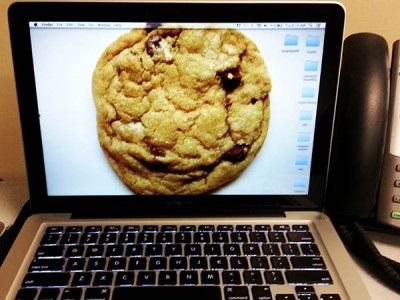 Speaking about the procedure for cleaning browsers from such files, one should not forget about Ognelis, whose users include millions of people around the world. So, in order to completely clear Firefox cookies, you need to follow some simple steps.
Speaking about the procedure for cleaning browsers from such files, one should not forget about Ognelis, whose users include millions of people around the world. So, in order to completely clear Firefox cookies, you need to follow some simple steps.
First, click on the settings button located in the upper left corner of its working window. There you should select the "Settings", go to the "Privacy" tab. A dialog box opens, at the bottom of which there is a link “Delete individual cookies”. When it is activated, another window will open in which you can either delete some specific identifiers, or completely delete their entire history.
Working on someone else’s computer ...
Often there are situations when you have to work on someone else's car. Based on the foregoing, it will not be a great revelation to say that you need to pay special attention to maintaining a javascript cookie.
If you carefully read the article, then you can surely remove traces of your work on the computer. But we should not forget that almost all modern browsers offer users the incognito mode of operation. How to enable it?
Google chrome
To use the "secret" mode in "Chrome" or the modern "Opera", it is necessary to perform several simple actions. To get started, click on the icon with the image of three dashes in the corner of the main working window of the browser.
A window opens with the settings, in which you should select "New window in incognito mode." A new session will start in which the browser will not save any data.
Mozilla firefox
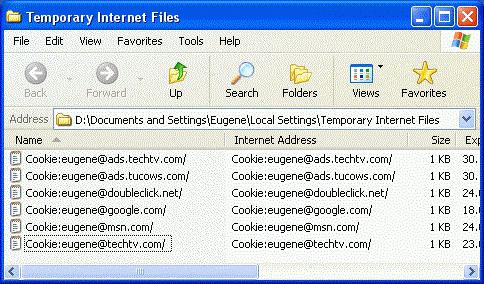
In this popular browser, enabling this mode is also easy. In order to not save Firefox cookies, you need to click on the settings button in the upper left corner of the browser dialog box. A window with settings will open, in the upper left corner of which there is an item “New private window”. After that, a new session will open, in which mode the browser will also not save any of your information.
Unfortunately, in the famous IE there is no special configuration for this purpose. If you want to surf the Internet without leaving any traces, you must set the security level to “High” each time.
However, for the same purposes, you can use many modern antiviruses. For example, Kaspersky Internet Security allows you to completely prohibit reception, as well as to clear all cookies immediately after you exit the browser. Something similar is implemented in almost all modern security programs, which is another significant argument in favor of their mandatory presence on the computer of any user who actively uses the Internet.
Do not forget to delete these files in the case of using a mobile browser. IN lately cases of fraud associated with the theft of user personal data mobile devicesso caution will not hurt.
This is what cookies are and why they are needed!
Updated: July 28, 2017
Hello dear readers of the blog site. Almost immediately, any novice internet user encounters such a concept as a cookie. What does this mysterious word mean? Why are they sometimes cleaned? What is the difference between third-party cookies and direct cookies? How to turn them on or off? And most importantly - why?
No, we, of course, at the subconscious level understand that this thing is necessary, since everyone is talking about it, but it would be nice to drop a little deeper to separate the truth from fiction and dispel some of the myths associated with these mysterious cookies. Well, along the way, understand their purpose in order to clean, turn on and configure their reception in a browser with knowledge of the matter.
What are cookies - myths and reality
In simple terms, cookies are just pieces of data exchanged between your browser and the web servers that host the sites you visit (). The fact is that the http protocol is designed so that every time you access a new page of the same site, your browser seems to re-get acquainted with the server and everything that you did on the site a little earlier will be completely forgotten.
It would seem that so what ... However, most sites will not be able to work without such a thing as cookies. More precisely, they can, but lose some of their functionality.
For example, if you need to work on the site authorization, then each time you go to new page will have to re:
- The user enters the name and password into the login form located on the site and sends them to the server.
- The server receives them and checks for correctness, after which it gives the browser the page requested by the user. But along with its code, the browser receives a cookie with a session identifier. As a rule, they will be stored in the browser for some time, during which the user will be able to work with the site without re-authorization.
- When requesting other pages of the site from the server, the browser along with the request code also sends cookies with the session identifier. The server checks the identifier in its database and, under favorable circumstances, gives the code of the requested page.
And in the online store you can’t buy anything at all, because without a cookie it won’t work "Virtual basket" to store purchases.
What is noteworthy, the development of the cookie standard began precisely for the implementation of the basket in a package intended for Internet commerce. This happened in the early nineties of the last century by the authors of the now forgotten by all netscape Browser. Then the standard was revised in order to try to limit the use of cookies to collect personal data about browser users.
Cookies can also be used to store the settings that the user made on the site. For example, in you can set the number of answers to be displayed and the value of snippets. This data will be stored in your browser and applied every time you search.
In general, cookies are in most cases necessary and useful. But disputes over the fact that third-party cookies threaten user privacy. Where do these third-party cookies come from and what is it? The fact is that when loading (rendering) a web page, data can be loaded not only from the server where, in fact, the site is located, but also from third-party servers.
Examples of such things can be hit counts, scripts for loading contextual advertising blocks, various images stored not on the main site. And all this wealth when downloading can transmit to the browser its cookies, which in this case will be called third-party. It is they who are usually feared in terms of breach of confidentiality.
However, in the settings of some browsers third-party cookies can be enabled, because by default it is blocked for security reasons. In this regard, in various Internet browsers you can find approximately the following set of features:
- Disabling cookies completely.
- Clear all cookies when exiting the browser.
- Prohibition or restriction on the use of third-party cookies
- Creation of a “white” and / or “black” list of sites from which cookies will be either passed or blocked.
- Some browsers even have a manager to clear these entries for individual sites.
- Setting a limited cookie expiration date.
Regarding the last paragraph. The fact is that there are cookies that are deleted at the end of your session with this or that website. However, site developers have the opportunity to specify the life of these records, after which they will be cleaned. Such cookies are called persistent and it is precisely the limitation of their life span that is discussed in the last paragraph. They are usually stored in a separate file, which may be called cookies.txt.
Now let's dispel a few myths Overgrown by Cookies:
- Cookies do not identify a specific person (you), but individual browsers. Having opened the page of the same site in a different browser, you will be asked to log in again, because there will be no cookies talking about the previous authorization in this browser. If several people use the browser, then again this technology will not make a difference for them.
- Cookies are not programs (this is a regular text fragment), so they cannot be sources of viruses on your computers and cannot be viruses themselves.
- Also, they have nothing to do with pop-ups spontaneously in the browser windows. These things are disabled in different browser settings.
Now let’s list what really cookies can do:
- Using them, you can track exactly which pages you visited, and the shelf life of this data can be very high. The intelligence services of the most democratic country in the world were once accused of using cookies to spy and obtain confidential data in this way.
- If the traffic transmitted from your computer to the Internet is not encrypted, then attackers can intercept it and even read a cookie (intercept or replace it). Most often this happens when using WiFi without encryption.
- Cookies can also be set by programs in languages \u200b\u200bsuch as JavaScript, embedded in the text of pages, or other scripts running in the browser (i.e. without receiving this data from the server).
- At the moment, this technology has alternative solutions, but cookies are still the best option for the combination of their capabilities
Surely in the process of using the Internet you came across the term cookies. What it is? In essence, cookies are a file or several small files that store textual information. They are created when you visit sites that support this technology.
How do cookies work?
Everything is very simple. As soon as the browser receives a specific web page from the site, the connection between it and your PC breaks. If you decide to go to another page of the same resource or update the current one, a new connection will be established. On sites where there is no user authorization, this does not create any problems. But if it is necessary, without additional measures, the resource is not able to “remember” the people visiting it and display information in accordance with the preferences of each of them. To avoid a situation in which, moving between different pages of a site, a person is not perceived by the service as a new, unauthorized visitor, cookies help. What is text information, you already know. And cookies work very simply: when you switch from one page to another, the server sends a request for data from cookies to the computer. With the help of them, he finds out who is going to perform such an action, and then, based on the information received, satisfies the request or refuses. Cookies are also used when creating online stores. It is thanks to them that there may exist a basket familiar to us, in which data on selected, but not yet completed products are stored. And it is cookies that allow these products to not disappear from it while you are browsing other parts of the catalog and placing an order.
What are cookies useful for?
You already know about several aspects of using cookies. What is this, we also managed to find out. Now let's talk about what else this technology can be useful for and in which cases you can’t do without it.
Surely you know that now the so-called "affiliate programs" operate on many services. Almost all of them are long-term and last for months or even years. Throughout this period, information is stored on the hard drive, thanks to which the partner will receive a percentage if the user who clicks on his link orders a service or product from the seller.
When working with visit counters, rating and voting counting systems, cookies are also used. What does this give in this case? Cookies are necessary so that the system can determine that the user has already clicked on the link or left his vote. That is, there is some insurance against artificial wrapping. There are ways to get around this protection, however for ordinary users this result is more than enough.
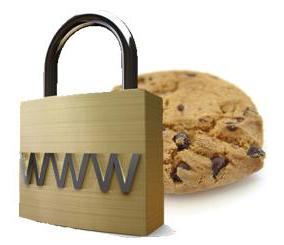
What to fear?
When working with cookies, it is important to remember that in some cases, seemingly innocuous textual information can be dangerous.
Cookies are one of the most important potential causes of online privacy violations. Why is this happening? Advertising sites always keep track of which ads a particular user is viewing. Cookies store data about which ads a person has already seen, track which topics are interesting to him. And while we are talking about cookies for a separate site, there is no need to talk about the leak of personal information. But if we are talking about large advertising networks, the codes of which are present on the vast majority of resources, everything becomes more complicated. So, thanks to the system, it can collect almost all information about human activities on the network. And if on some site he enters his name and surname, it becomes possible to connect all these actions with a real person.
There are other problems with cookies. Mostly they are faced by programmers who write document code. cookies for different sites. Without first familiarizing yourself with professional sources, you can assume that logins and passwords from the site are stored in cookies. As a result, it becomes very easy to remove and use for their own purposes. However, almost all more or less serious sites store passwords and logins in the database on the server. Cookies here are used simply as a conditional identifier for the user. Moreover, it is issued only for a short period of time. That is, even if a hacker manages to access cookies, he will not find any valuable information there.
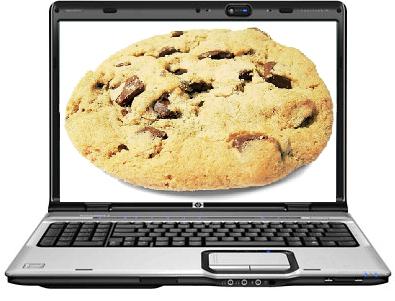
How to enable, disable and clear cookies?
If you decide to disable cookies, please note that you will have to enable them again each time you go to the site where it is required.
For Mozilla firefox. Go to the “Tools”. Next, you should find the “Settings” item, and in it - the “Privacy” tab. Opposite to Firefox, in the “History” frame, you need to select the “do not remember” item from the list.
For Google Chrome. Open “Options” by clicking on the button in the form. After that, go to “Advanced” -\u003e “Content Settings”. In the window that appears, select the Cookie item, and then select the item prohibiting sites from saving data.
As you can see, disable or enable cookies again in Chrome and Mozilla Firefox, the most popular browsers, very simple. In other browsers, this is done in the same way, using the Security, Privacy, and so on tabs.
If you need to clear cookies, it’s faster and easier to do this not using standard browser tools, but using special utility - cCleaner. Before cleaning, you need to close all browsers, otherwise deleting all cookies will fail.
In general, the best option is to install one of the programs that automate the work with cookies. Now there are a huge number of such applications, they weigh quite a lot and save users from the need to constantly change the settings manually.


